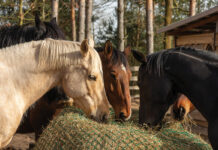Q: My horse is a very easy keeper. He lives outdoors 24/7 and doesn’t get any grain. He wears a grazing muzzle in the spring and summer which seems to keep him from getting too fat, but is he getting all the nutrition he needs? Is there any chance he could have a vitamin or mineral deficiency when all he eats is limited pasture?

A: It sounds like you’re doing a great job managing your horse and are putting a lot of thought into caring for him properly! Many times, in an effort to maintain a healthy weight in our horses, we accidently deprive them of the complete and balanced diet they need for optimum health and performance. While limiting calories—especially from simple carbohydrates like sugars and starches—is appropriate for easy keepers, it is NOT appropriate to limit essential nutrients such as protein, vitamins, and minerals. Fortunately you have a couple choices to bridge the gap.
One option is a multi-vitamin/mineral supplement. Generally fed at a rate of 2-4 ounces per day, a simple “multi-vitamin” is a good choice for a horse on a restricted amount of high-quality grass and/or hay. Horses don’t need as much protein as some people think—the NRC Nutrient Requirements of Horses says an 1100 pound adult in light exercise needs 700 grams (about 1.5 pounds)—and 22 pounds of a 14% crude protein (CP) hay meets that requirement. So if you’ve had your hay or pasture analyzed and know what the CP level is or are feeding a grass/alfalfa mix, your horse is probably getting enough protein unless he’s in significant work.
On the other hand, if your horse’s forage does not provide enough protein or if your horse is in moderate to heavy work, then a ration balancer may be the better option. This category of product contains protein in addition to vitamins and minerals. Don’t be put off though by the high level of protein advertised on the bag such as 30%. The feeding rate for ration balancers is one to two pounds per day so he’ll be getting just 135 to 270 grams of protein which is well below his daily requirement but still a significant boost of amino acids to supplement poor quality roughage or help support a hard-working horse.
Couple more pieces of advice: make sure you’re providing salt in a form that your horse will actually use (many horses dislike licking a salt block so top dressing loose salt is a better way to go). Also, talk to your vet about the possibility of your horse having Equine Metabolic Syndrome, a collection of metabolic and endocrine abnormalities associated with the development of laminitis in horses. Not every overweight horse has EMS and not every EMS horse is overweight, but there’s enough overlap to justify a chat with your vet and possibly testing. Keep up the good work!
Throughout 2014, Dr. Lydia Gray will be answering your horse-health questions at horseillustrated.com/AskTheVet. Got a question for Dr. Gray? Send it to hc-editor@i5publishing.com and use subject line “Ask the Vet.”






